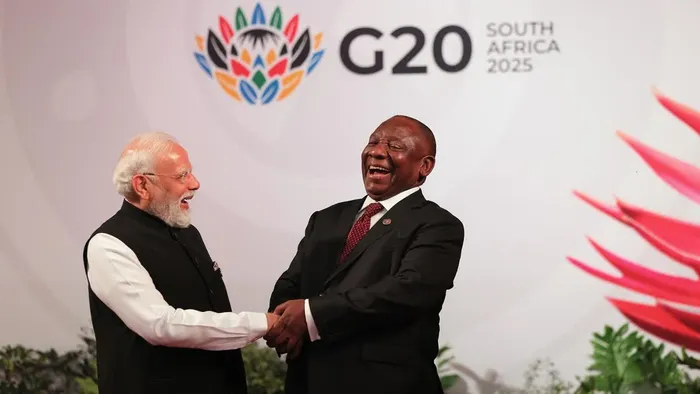
Indian Prime Minister Narendra Modi, warmly welcomed by South African President Cyril Ramaphosa.
Image: Supplied
AT THE historic 20th G20 Summit in Johannesburg — the first ever held on African soil — Indian Prime Minister Narendra Modi, warmly welcomed by South African President Cyril Ramaphosa, emerged as a key voice advocating development, solidarity, and sustainable growth, particularly for the Global South.
Ramaphosa, acknowledging India as “a key partner in advancing development and solidarity between the Global South countries,” set a tone of shared vision and strong collaboration between the two nations, emphasising the summit’s focus on Africa’s development and its role in global governance.
Modi grounded India’s approach in the philosophy of “Integral Humanism”, explaining it as “bringing harmony between progress and planet”. He stressed India’s commitment to inclusive growth with the principle of “leaving no one behind”.
Modi highlighted the significance of this summit being hosted in Africa and reflected on India’s previous G20 presidency, during which the African Union (AU) became a full member of the G20, symbolising the continent’s emerging voice on the global stage.
He spoke about the need to focus on “financing for development and the debt burden,” as well as “disaster risk reduction,” “just energy transitions,” and “critical minerals,” all vital to Africa’s future growth. Modi also underscored India’s investment in human capital through offshore Indian Institute of Technology campuses in Africa, aimed at building the continent’s skilled workforce.
President Ramaphosa’s opening remarks reinforced this partnership, emphasising the importance of multilateralism and inclusive development. “A key obstacle to inclusive growth in developing economies, including many in Africa, is an unsustainable level of debt,” he said, advocating for “sustainable solutions to tackle high structural deficits and liquidity challenges”.
He reiterated South Africa’s commitment as G20 president to place Africa’s priorities firmly on the global agenda, pushing for climate justice, economic inclusion, and mobilising finance for a just energy transition. Ramaphosa’s vision reflects a broader call for Africa’s rise as a global hub for innovation, commerce, and technology.
From the South African Department of International Relations and Cooperation (Dirco), officials emphasised India’s vital role in championing Africa’s development within the G20. They noted the shared goals of both nations in advancing education, capacity building, and technology transfer.
India’s recognition of the AU as a full partner and its south-south cooperation initiatives, including with South Africa and Brazil through IBSA, were highlighted as pillars of this deepening partnership.
Together, the leaders projected a shared future rooted in “Vasudhaiva Kutumbakam”, or “the world is one family”, a guiding principle stated by Modi as “One Earth, One Family, One Future”. Their cooperation within the G20 framework aims to craft a more inclusive, equitable global order that gives voice and opportunity to Africa and the wider Global South.
Modi’s and Ramaphosa’s advocacy demonstrated an evolving global diplomacy role as champions of sustainable development and multilateralism, signalling a transformative alliance between India, South Africa, and Africa at large for a fairer and more sustainable world.